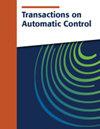关于分布式规定时间未知输入观测器
IF 7
1区 计算机科学
Q1 AUTOMATION & CONTROL SYSTEMS
引用次数: 0
摘要
本文研究了一类线性时不变系统(我们称之为目标系统)的分布式规定时间未知输入观测器(DPTUIO)的设计。文献中关于分布式未知输入观测器的结果没有解决收敛时间的预定义问题。为了实现快速估计,本文采用弱不可观测子空间分解,并引入时间尺度变换技术,开发了一种新的DPTUIO。这种设计确保,对于每个节点,可以在预先分配的时间内估计目标系统的整个状态,尽管每个节点仅测量系统输出的一小部分。详细讨论了DPTUIO的存在条件。建立了观测器匹配条件、联合强可观测性条件和强连通通信网络构成DPTUIO存在的充分条件。此外,通过严格的推导,详细分析了所开发的DPTUIO对测量噪声和通信噪声的鲁棒性。最后,通过一个实例验证了所提方法的有效性。本文章由计算机程序翻译,如有差异,请以英文原文为准。
On Distributed Prescribed-Time Unknown Input Observers
This article is concerned with the design of the distributed prescribed-time unknown input observer (DPTUIO) for a class of linear time-invariant systems, which we refer to as the target systems. Results on distributed unknown input observers in literature did not address the convergence time predefinition problem. To achieve fast estimation, this article uses weakly unobservable subspace decomposition and introduces a time-scale transformation technology to develop a novel DPTUIO. This design ensures that, for each node, the entire state of the target system can be estimated within a preassigned time, despite each node measuring only a small portion of the systems output. Detailed discussions on the existence conditions of the DPTUIO are provided. It is established that the observer matching condition, along with the jointly strongly observability condition and a strongly connected communication network, constitutes sufficient conditions for the existence of the DPTUIO. Moreover, the robustness of the developed DPTUIO against measurement and communication noise is analyzed in detail with rigorous deduction. Finally, a practical example is used to verify the effectiveness of the proposed methods.
求助全文
通过发布文献求助,成功后即可免费获取论文全文。
去求助
来源期刊

IEEE Transactions on Automatic Control
工程技术-工程:电子与电气
CiteScore
11.30
自引率
5.90%
发文量
824
审稿时长
9 months
期刊介绍:
In the IEEE Transactions on Automatic Control, the IEEE Control Systems Society publishes high-quality papers on the theory, design, and applications of control engineering. Two types of contributions are regularly considered:
1) Papers: Presentation of significant research, development, or application of control concepts.
2) Technical Notes and Correspondence: Brief technical notes, comments on published areas or established control topics, corrections to papers and notes published in the Transactions.
In addition, special papers (tutorials, surveys, and perspectives on the theory and applications of control systems topics) are solicited.
 求助内容:
求助内容: 应助结果提醒方式:
应助结果提醒方式:


